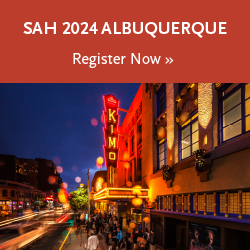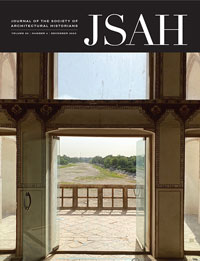Apr 14, 2021
by
University of Rochester News
Guggenheim fellow Peter Christensen explores an understudied shift affecting the way buildings are conceived, designed, and constructed.
People widely describe architecture as a meeting of science and art, says associate professor of art history Peter Christensen at the University of Rochester. But his latest project, still in the early phases of research, aims to look at that characterization in detail. He’s using the measure of patents and patentability in the history of architecture to tease apart the distinctions people have made between technology and art—and to see how architectural “authorship” has functioned.
The project has just earned Christensen a Guggenheim fellowship for the 2021–22 academic year, as well as a residency at the Institute for Advanced Study in Princeton, New Jersey, where he will be associated with the School of Historical Studies.
His book manuscript is tentatively titled “The Architectural Patent: Inventing Modernity” and spans the period from the English Patents Reform in 1852 to the World Intellectual Property Organization Copyright Treaty of 1996 to explore four phases of the relationship between patents and the pursuit of invention: definition, protection, commercialization, and democratization.
The term invention entered the architectural lexicon in the 19th century. “It’s entirely tied to the Industrial Revolution,” says Christensen. “You have the birth of the factory, the birth of mass production, and as a result, you have all of these issues come up with how architecture fits into that equation.”
Read full article here
Peter Christensen joined SAH in 2008. He has been a member of the H. Allen Brooks Travelling Fellowship Committee and Johnson Exhibition Catalogue Award Committee. He served as a session chair at the SAH Annual Conference in 2015 in Chicago.
About the Guggenheim Fellowship
The John Simon Guggenheim Memorial Foundation established its fellowship program in 1925 to help provide fellows with time in which they can work with “as much creative freedom as possible.” There are two annual fellowship competitions, one for citizens and permanent residents of the US and Canada; the other, for citizens and permanent residents of Latin America and the Caribbean. The foundation receives approximately 3,000 applications each year and awards about 175 fellowships per year.


